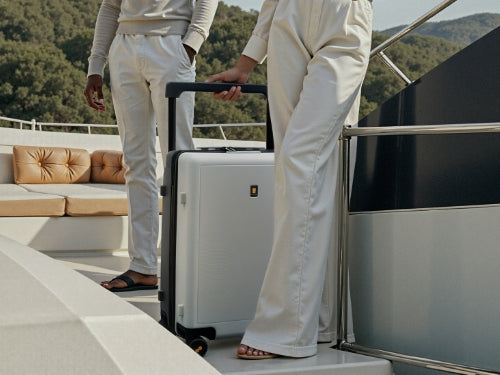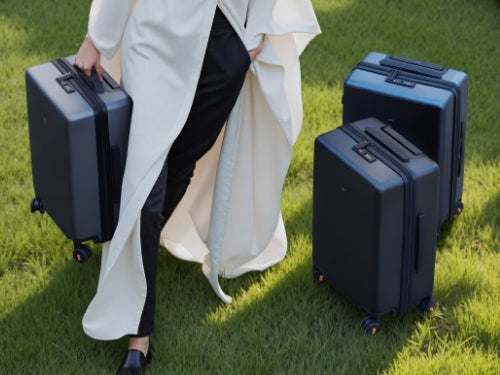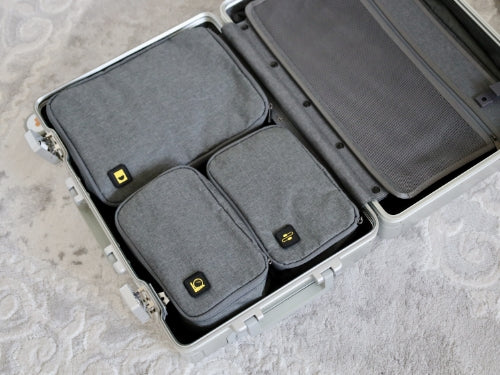Table of Content
Learn sustainable traveling tips, be a better traveler

During the quarantine, we see nature is returning to the cities. For instance, people in Venice are reporting that they can see the sandy bed below the waters, shoals of tiny fish, scuttling crabs, and also various colored plants are all coming out. This inspires us to think about how to be a better traveler in the future and what you can improve over your next trip. Read on to learn some amazing sustainable traveling tips!
Get a traveling backpack
A great way to take a trip eco-friendly is to get a traveling backpack. Traveling backpacks up to 30 liters in size is ideal for shorter trips and you can use them during your daytime exploration of the city you visit. Not only does this save your time and money, packing lighter means much less weight for the airplane, which saves on airline fuel usage.

Know what community-based tourism is
When we speak about ecotourism at traveling conferences all over the world, we always stress the truth that accountable traveling has to profit both the ecology as well as the economy of an area in order to genuinely be "environmentally friendly." In our eyes, community-based tourism is the reverse of mass tourism, and also is utterly vital for travel to be absolutely lasting.
When the tourist industry purchases profiting locals, the people have a vested interest in protecting the location's natural deposits. For travelers, this emphasizes the relevance of purchasing, staying, as well as shopping in your area, and involving yourself in the neighborhood culture. When you buy directly from a local artisan, stay in a locally-owned resort or B&B, as well as eat at a locally-owned dining establishment that sources its food from the town, you're ensuring that the cash you invest stays in the local community.
Likewise, when you eat and drink where locals eat and drink, as well as visiting shops that aren't owned by global corporate empires, you're getting a real taste of the regional culture instead of a homogenized variation. To be honest, isn't checking out the sights and tastes of societies different from our very own among the primary attracts of traveling in the first place?
Bret Love and Mary Gabbett from Green Global Traveling (read more from them here).
Pick up slow traveling as an ideology
One way to travel even more sustainably is to slow down. Rather than jetting off from location to location, pick one place and dive deeper into that location. Traveling gradually enables travelers to minimize their carbon exhausts because of slower transportation used. For example, buses and trains, create less carbon emissions than planes. Staying longer in a place also allows a traveler to find more locally-owned services, thus putting their money toward the region’s economics instead of a worldwide chain.
Astrid Vinje from The Wandering Little girl (you can read more from Astrid right here).

Know local garbage and recycling laws
Normally before embarking on your travels, you do some research on where you should visit, where to eat and what the local customs are before your travel. Have you ever explored local trash as well as reusing regulations? Most likely not as it’s not popular information for travelers.
Actually, different countries and cities have their own practices of trash disposing and recycling. Learn and read local guides to help that region’s sustainable process.
It’s convenient and useful to keep a little bag with you to hold garbage as sometimes there are not any trash facilities nearby. I often tend to keep a bag in my car or in my daily bag to make a habit of it and also have used these bags many times.
Helene from Wandering Helene (you can read more from Helene right here ).

Travel by bicycle
Bicycle is a recommended transportation for sustainability. Though not all places have a large number of bicycles, for some vacations, riding a bike to get from place to place is both simple and fun.
Bikes facilities and rental programs are more and more popular in cities nowadays. Some hotels even open rental services for using bikes.
Biking travel is not only good for cutting down carbon emissions but also beneficial for individuals’ healthy as you get good exercise traveling that way.
Also due to its flexibility, you could stop anywhere you want and just discover the places you’re interested in.
Derek Hartman as well as Mike Walsh from Bathrobe Trotting (you can find out more from them at this blog post to see a city like a regional).

Avoid plastic bag use
It’s inevitable that you’ll make purchases while traveling: souvenirs, clothing, food, and beverages, etc. Vendors would provide plastic bags to you with the purchase. Given that they are so light-weight, these plastic bags usually wind up in seas, causing a hazard to aquatic life.
Plastic waste is a vital factor in air pollution. Say "no" to plastic bags, plastic straws, and any unneeded product packaging. Rather, bring a daypack with you, or fold up a little recyclable bag and keep it in your pocket.
Suppliers may act somewhat stunned when you say you will not need a bag, particularly in areas where recycling is not greatly encouraged. Yet in reality, you do not need one. These little acts make a sustainable living and minimize our use of plastic.
Delilah from Our Traveling Mix (you can find out more from Delilah here ).

Use businesses that believe in sustainability
As climate changes, natural disasters, and a great amount of waste catch more and more people’s eyes, sustainable travel is clearly not a thing of the future. Travel accounts for 8% of the total carbon discharges in the world.
Travel Love Repeat, a start-up based out of Kolkata plans to take on that issue. Shreya Saha and Richie Sharma started the company in 2019 to curate zero-waste, vegan, and also eco-friendly traveling schedules to locations that they have assessed.
What makes TLR different from other travel firms is that their focus remains on offering the very best experience with the least damage to the planet. They provide a zero-waste set to all travelers and support the regional economy by remaining with the local people as well as appreciating their solutions and products. Zero-waste means selecting not to get bottled water, packaged snacks, and making use of the most environmentally-friendly transportation techniques.
Shreya Saha and also Richie Sharma from Traveling Love Repeat (find out more from them right here)











Leave a comment